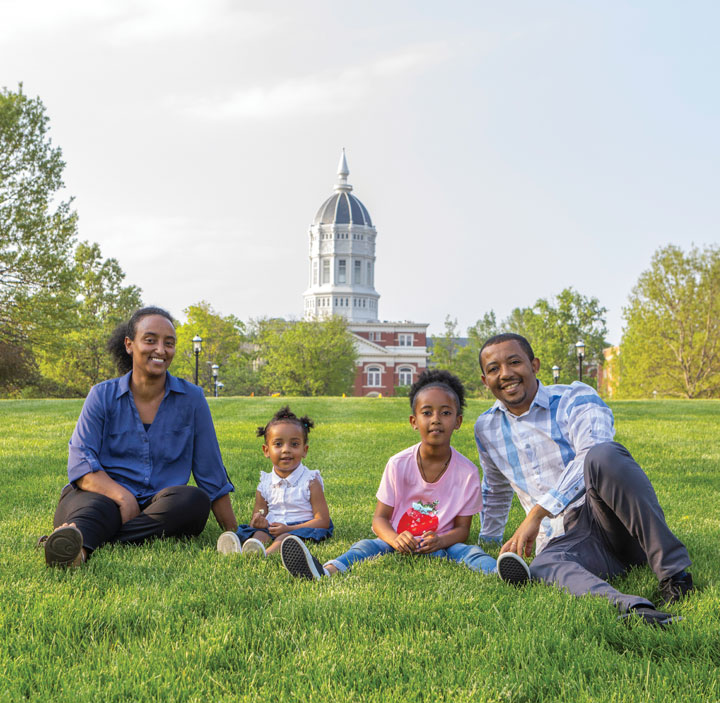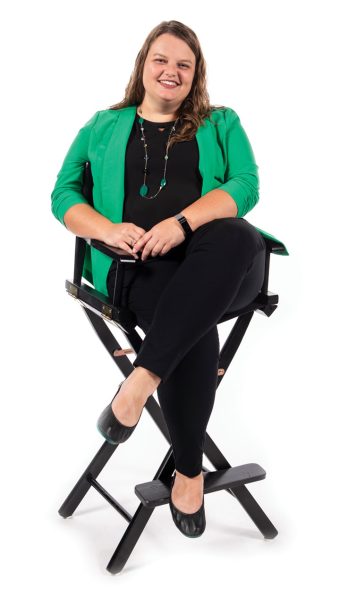Published on Show Me Mizzou August 25, 2022

Illustration by Blake Dinsdale
Location matters
A youngster’s neighborhood often shapes their exposure to firearm violence or substance use — situations that raise their risk of becoming homeless, says Hsun-Ta Hsu, associate professor of social work. For earlier studies on suicide and HIV prevention among people experiencing homelessness, Hsu walked block by block identifying signs of blight — broken windows, sidewalks in disrepair, piles of garbage — because neighborhood-level data are difficult to find. The scarcity of information prevented him from conducting research on a larger scale.
To help remedy the problem, Hsu and Jianlin Cheng of the College of Engineering developed a program that allows them to drop a pin on a digital map and download relevant Google Street View images. With that on screen, they can document characteristics of a homeless youth’s neighborhood without visiting in person.
Getting people into housing is a main method of addressing homelessness, but Hsu’s research suggests the location of that housing affects whether they will become homeless again. “Neighborhood characteristics play a critical role, and that’s exactly what I’m trying to understand through the technology we developed,” Hsu says.
Next, Hsu wants to develop an artificial intelligence- informed algorithm that can catalog even more widespread areas automatically. Eventually, he hopes homeless youth could give their location to researchers or clinicians, who could quickly access data to see how the area might affect their behaviors.

Gashaye Tefera and his family — wife Mackda and daughters Melos, left, and Barckot — were recently reunited in Columbia after being separated for nearly two years due to the pandemic. Photo by Sam O’Keefe.
Health care for newcomers
Gashaye Tefera knows firsthand how difficult it is for international students to deal with unfamiliar health care systems. In 2018, he was a fellow at the world’s largest nonprofit, United Way Worldwide, in Alexandria, Virginia, when he started having gastrointestinal issues. But he struggled to understand the care and the cost of coverage, so he delayed seeking treatment. “I’m used to health services that are more universal,” says Tefera, who grew up in Ethiopia and studied in five European countries through the prestigious Erasmus Mundus scholarship. Despite his education and experience, he says, “I still didn’t know how to navigate the insurance system.”
After completing a master’s degree that looked at a gender-based violence prevention program in Ethiopian refugee settings, he came to Mizzou to earn a doctorate in social work. His research: immigrant women’s access to health services. Tefera’s systematic review published in February showed that immigrant women experience personal-level barriers, including lack of transportation and language proficiency, as well as system-level barriers, including discrimination and miscommunication, and that they rely on family, community support and cultural solutions to overcome them. His dissertation will focus on the experiences of African immigrants.
Tefera relied on his own resilience and the support of the MU School of Social Work during the pandemic. When COVID shut down embassies around the world, he was separated for nearly two years from his wife and two young daughters who were in Ethiopia getting their international travel documents in order. Read more about his family’s story online: tinyurl.com/Gashaye

Ashley Givens. Photo by Michael Cali.
Emphasizing empathy
Ashley Givens first got into social work because she wanted to help underserved youth. During her years of study and research, her focus turned to working with mental health and the adult criminal legal system. Now an assistant professor of social work at Mizzou, Givens’ interests have come full circle: She recently received a Richard Wallace Faculty Incentive Grant to study using structured journaling to strengthen the bond between incarcerated mothers and their children. “It’s a way for these women to reconnect with their kids and maintain the mother-child bond in a directed, meaningful way,” Givens says.
Givens’ early work included training probation officers in recognizing and better interacting with people dealing with mental illnesses. Overall, she says, the criminal legal system still has much work to do when it comes to the mental well-being of the people it affects. “As a social worker in that system, we have the opportunity to change the mentality,” Givens says. “Just because someone is convicted of a crime doesn’t mean they are any less human or deserving of humane treatment.”

Kathleen Preble
Surprising snapshot of trafficking survivors
Contrary to common belief, the portrait of a human-trafficking survivor in Missouri is not that of a young, white teenager who is abducted and forced into the sex trade. Instead, Kathleen Preble’s survey of the state’s social service providers found that survivors usually are Black or brown (46%) and Asian (10%). The assistant professor of social work also found that 18- to 35-year-olds make up the bulk of the survivors (56%). The vast majority were not immigrants but rather poor or working-class U.S. citizens trafficked for sex (83%), labor (5%) or both (13%). In considering survivors’ prospects for the future, she says, they had to possess great “agency, strength and resilience to have survived the experience of exploitation.” Even so, Preble says, survivors need access to treatment for mental health and substance use as well as appropriate housing.

Courtesy Christine Woods
Cultivating Black social workers
Sixty-five percent of young Black people with mental health concerns don’t receive treatment due to the lack of both access and therapists of color. “For the African American community … the research says that they do better and they’re more apt to seek services from people they can identify with,” says Christine Woods, who directs the Bachelor of Social Work degree program. In response, Woods, BS ’97, MSW ’02, EdD ’21, has during the past four years grown the program by 46% and increased the diversity of its students.
“I’m very intentional about using every chance I get in representing the school because when people see there’s someone that looks like them in the school, they’re more apt to lean toward that because there’s someone who can understand their experience,” Woods says. She is quick to point out that the program’s concept of inclusion efforts also includes men, LGBTQ individuals and socioeconomic diversity.
The dearth of Black therapists is an issue Woods addresses in her private therapy practice, too. Crowned Counseling in Columbia employs and trains Black clinicians to increase access for Black Missourians seeking therapy.
“Her efforts represent a national model for what we must do to increase the number of Black therapists,” says Aaron Thompson, who directs the School of Social Work. In the coming year, Woods plans to expand her practice and hire more therapists of color in other parts of Missouri.




